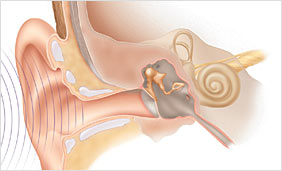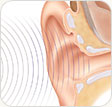NASHVILLE ENT AUDIOLOGY
YOUR HEARING
YOUR HEARING
The sense of natural hearing is a very fine-tuned, intricate process. To hear naturally, the whole sound sensing system must work right. If a part of the outer, middle, or inner ear is damaged or missing, a person can have hearing loss.


Outer Ear: The part you see gathers sounds and sends it to the middle ear

Middle Ear: The sound moves the eardrum and three tiny bones, sending the sound to the inner ear.

Inner Ear: A part called the cochlea has tiny “hairs” that change sounds into signals. The signals travel on nerves to the brain. The brain decodes the signal to “hear” the sound.
Many terms are used for hearing loss–deaf, deafness, hard of hearing, hearing-impaired, nerve deafness, and others. They all refer to what happens when some part of the ear or its inner parts do not work right. A part can be missing, misshaped, or damaged. Other parts may work fine, but without all parts working together, hearing is impaired.
The type and severity of hearing loss depends on which parts don’t work and how much they don’t work. The amount of hearing loss a person has is commonly ranked as mild, moderate, severe, or profound.
Some people hear the same sounds as people with normal hearing, but softer (for example, might hear a ringing telephone, but miss quietly rustling leaves).
Some people hear certain sounds fine (such as low-pitched sounds like a rumbling train), but not others (such as high-pitched sounds like twittering birds).
Some people can hear in one ear, but not the other (unilateral); some have problems in both ears (bilateral).
Some hearing problems can be present when a baby is born (congenital hearing loss); other hearing problems develop later in life (acquired hearing loss).
Conductive hearing loss – a mild to moderate hearing loss due to problems in the middle ear.
Sensorineural hearing loss – a mild to profound hearing loss due to problems in the inner ear.
